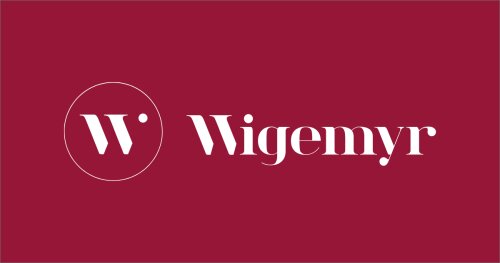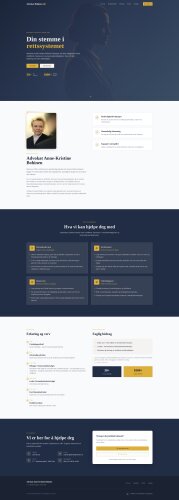Best Animal Law Lawyers in Norway
Share your needs with us, get contacted by law firms.
Free. Takes 2 min.
Or refine your search by selecting a city:
List of the best lawyers in Norway
About Animal Law in Norway
Animal Law in Norway encompasses the legal provisions and regulations that govern the treatment and protection of animals within the country. This field of law seeks to safeguard animal welfare, address issues of cruelty and neglect, and ensure ethical treatment of animals in various sectors, including agriculture, entertainment, and as pets. Norway is known for its progressive stance on animal welfare, with legislation that underscores the importance of humane treatment and prevention of suffering. The Animal Welfare Act is the primary legal framework that sets out the responsibilities and standards for individuals and organizations interacting with animals.
Why You May Need a Lawyer
There are multiple scenarios where individuals may require legal assistance in the realm of Animal Law in Norway. Examples include facing accusations of animal cruelty or neglect, navigating disputes over the ownership of pets, or dealing with conflicts regarding animal breeding or transportation. Lawyers specializing in Animal Law can provide guidance in situations where individuals or businesses stand accused of violating animal welfare regulations. Additionally, legal advice may be necessary for organizations seeking to ensure compliance with the Norwegian Animal Welfare Act or for individuals looking to advocate for stronger animal protection laws.
Local Laws Overview
Norwegian Animal Law is primarily governed by the Animal Welfare Act, which establishes a legal framework for the protection and welfare of animals. Key aspects of the law include:
- Animal Welfare Act: Enforces humane treatment and prohibits any unnecessary suffering inflicted on animals.
- Regulations on Animal Transport: Sets standards for the humane transportation of animals, including provisions for their safety and comfort.
- Breeding Standards: Establishes guidelines to prevent inhumane breeding practices and ensure the health and welfare of animals.
- Wildlife Protection: Includes laws for the protection and management of wild animal populations within Norway’s ecosystems.
- Companion Animals Ownership: Regulates the treatment and responsibility towards pets, ensuring their welfare and health.
Frequently Asked Questions
What is the main legislation governing animal welfare in Norway?
The primary legislation is the Animal Welfare Act, which sets out the principles and requirements for the humane treatment of animals across various sectors.
What actions are considered animal cruelty under Norwegian law?
Animal cruelty can include physical harm, neglect, deprivation of necessary sustenance or care, and any actions causing unnecessary suffering or distress to an animal.
How do I report a case of animal abuse or neglect?
Individuals can report cases of animal abuse or neglect to local authorities, such as the Norwegian Food Safety Authority (Mattilsynet), which oversees animal welfare enforcement.
Are there any specific requirements for transporting animals?
Norwegian law requires that animals be transported in conditions that ensure their safety and comfort, preventing stress and suffering during transit.
Can I keep exotic animals as pets in Norway?
There are restrictions on keeping exotic animals as pets, with certain species prohibited to protect both animal welfare and public safety.
What legal responsibilities do pet owners have in Norway?
Pet owners are legally required to ensure the welfare of their animals, providing adequate food, shelter, and veterinary care, and preventing unnecessary suffering.
How are disputes over pet ownership resolved?
Pet ownership disputes can be resolved through legal mechanisms, with courts examining evidence such as veterinary records and registration documents to determine ownership.
Is there legal protection for wildlife in Norway?
Yes, wildlife is protected under various environmental laws that ensure sustainable management, conservation, and protection of native species.
What are the penalties for violating animal welfare laws?
Penalties can range from fines to imprisonment, depending on the severity of the violation, and may include bans on owning or working with animals in severe cases.
What resources are available for legal advice in Animal Law?
Individuals can consult law firms specializing in animal welfare, contact animal protection organizations, or seek assistance from legal aid services specializing in environmental law.
Additional Resources
For those seeking further information or assistance regarding Animal Law in Norway, the following resources may be helpful:
- The Norwegian Food Safety Authority (Mattilsynet): Oversees animal welfare regulations and enforcement.
- Norwegian Animal Welfare Alliance (Dyrevernalliansen): Provides advocacy and support for animal welfare issues.
- Local Veterinary Associations: Can offer advice on animal health and legal matters related to pet ownership.
- Environmental Protection Agencies: Offer guidance on wildlife conservation and regulations.
- Legal Aid Bureaus: Provide assistance to individuals requiring legal support in animal-related disputes or violations.
Next Steps
If you require legal assistance within the field of Animal Law in Norway, consider the following steps:
- Assess Your Situation: Identify the specific legal issue you are facing, whether it involves animal cruelty accusations, ownership disputes, or compliance with regulations.
- Consult with a Lawyer: Seek out a lawyer with expertise in Animal Law who can provide tailored legal advice and guidance on your situation.
- Gather Relevant Documentation: Collect any evidence or documents that support your case, such as veterinary records, photographs, or witness statements.
- Contact Relevant Authorities: If applicable, report the issue to authorities like the Norwegian Food Safety Authority for investigation and potential enforcement action.
- Explore Mediation Options: For disputes, consider alternative dispute resolution methods such as mediation, which can be a more amicable and cost-effective solution.
- Stay Informed: Keep abreast of changes in Animal Law regulations to ensure ongoing compliance and to strengthen your position in any legal dispute.
Lawzana helps you find the best lawyers and law firms in Norway through a curated and pre-screened list of qualified legal professionals. Our platform offers rankings and detailed profiles of attorneys and law firms, allowing you to compare based on practice areas, including Animal Law, experience, and client feedback.
Each profile includes a description of the firm's areas of practice, client reviews, team members and partners, year of establishment, spoken languages, office locations, contact information, social media presence, and any published articles or resources. Most firms on our platform speak English and are experienced in both local and international legal matters.
Get a quote from top-rated law firms in Norway — quickly, securely, and without unnecessary hassle.
Disclaimer:
The information provided on this page is for general informational purposes only and does not constitute legal advice. While we strive to ensure the accuracy and relevance of the content, legal information may change over time, and interpretations of the law can vary. You should always consult with a qualified legal professional for advice specific to your situation.
We disclaim all liability for actions taken or not taken based on the content of this page. If you believe any information is incorrect or outdated, please contact us, and we will review and update it where appropriate.
Browse animal law law firms by city in Norway
Refine your search by selecting a city.














